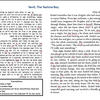4: Short story excerpts, I.B. Singer's "Yentl the Yeshiva Boy," Yiddish, 1963, and English translation, 1962.
In Yiddish, masculine pronouns are ער (er, him,) אים (im, him,) and זײַן (zayn, his.) Feminine pronouns are זי (zi, she) and איר (ir, her, hers.) The underlined words in the excerpts show the changes from masculine pronouns in the Yiddish story to feminine pronouns in the English story.
Suggested Activity: Ask students why they think the pronouns are changed from masculine in the Yiddish to feminine in the English translation. What effect does this change have? Singer always authorized the translations of his texts. Why might he have allowed this change?
Sources: Isaac Bashevis, “Yentl der yeshive-bokher,” Di goldene keyt, 46 (1963), 91-110.
Isaac Bashevis Singer, “Yentl the Yeshiva Boy," Commentary vol. 34, no. 3 (Sept. 1962), 213-24. https://www.commentarymagazine.com/articles/yentl-the-yeshiva-boy-a-story/

